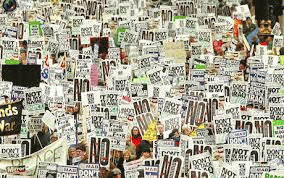Last week marked the tenth anniversary of the mass international demonstrations held to protest plans for war against Iraq. On the weekend of February 15-16, 2003, some 10 million people participated in coordinated protests in major cities of the world.
In Rome, the largest anti-war rally in history drew some 3 million people -- more than the population of the city itself. One-and-a-half million people attended a rally in Madrid, and one million took to the streets in London. In the United States, demonstrations were held in over 200 cities, including one in New York that brought a crowd of 400,000.
In a nervous and astonished acknowledgement of the significance of these demonstrations, the New York Times wrote that the protests "are reminders that there may still be two superpowers on the planet: the United States and world public opinion." By this, the chief organ of American imperialism meant that the so-called "unipolar moment" -- the US ruling class' dream of having a free hand following the fall of the Soviet Union to carry out unconstrained aggression on a world stage -- was threatened by the opposition of the great mass of humanity.
In considering the significance of the tenth anniversary of these protests, the question that immediately presents itself is: Where is the anti-war movement today?
The past 10 years, after all, have seen an enormous escalation of militarism, led by the United States. The wars in Afghanistan and Iraq have been followed, under the Obama administration, by the overthrow of the government in Libya and a civil war in Syria, stoked up by Washington for the purpose of ousting the regime of Bashar al-Assad and installing a government more amenable to US interests, which include isolating Syria's ally Iran in preparation for a possible attack on that country. The war in Syria is meanwhile entering a new phase as the US considers the direct arming of the so-called "rebels."
Click Here to Read Whole Article
At the same time, the Obama White House has vastly escalated the program of drone warfare in Afghanistan, Pakistan, Yemen and Somalia. It has declared the right to assassinate anyone it deems to be a "terrorist," including American citizens, anywhere in the world. It is implementing a "pivot" to East Asia and the Pacific, targeting China, which it sees as a principal geo-political competitor.
The US is not alone. France has taken the lead in intervening in Mali, and the German press is braying for an expansion of German militarism to advance German industry's interests in the coming "resource wars."
The mass sentiment that erupted 10 years ago has not gone away. However, the organizations that largely led these protests have worked systematically to smother this sentiment and direct it back into the political establishment.
This is particularly true in the United States, where, through the mechanism of the Obama administration, liberal and "left" forces have not only reconciled themselves to imperialism, but have become some of its most fervent proponents.
In recent weeks, for example, the Nation magazine has supported the nomination for CIA director of John Brennan, the main architect of Obama's "kill lists" and proponent of the extra-judicial assassination of US citizens. "Left" filmmaker Michael Moore, whose anti-war documentary Fahrenheit 9/11 attracted large crowds when it was released in 2004, has hailed the film Zero Dark Thirty, directed by liberal Kathryn Bigelow, which glorifies torture.
Groups like the International Socialist Organization do their best to portray the CIA-backed operation in Syria, carried out in an alliance with Al Qaeda-linked forces, as a "popular movement," criticizing the Obama administration for not providing more advanced weaponry to the pro-imperialist "rebels." This follows their support for the "Green Revolution" in Iran and the neo-colonial operation in Libya.
The integration of the "left" into the imperialist establishment is an international phenomenon. The Socialist Workers Party in Britain, which played a major role in the Stop the War Coalition that called the 2003 protest in London, is among the strongest supporters of the Syrian "rebels." In Italy, the site of the largest protests in 2003, Communist Refoundation became a governing party in 2006 and voted to support the Italian military presence in Afghanistan. Socialist Alternative in Australia recently denounced the "knee-jerk anti-imperialism" of the left.
The movement of these political tendencies into the camp of imperialism is an expression of changes in political alignments that are bound up with basic class issues.
There has been a significant political development in what can generally be called the "anti-war movement" over the past half-century. As it emerged in the 1960s, this movement was dominated by sections of the radical middle class. The organizations that played a significant role in the protests against the Vietnam War, such as the Students for a Democratic Society and the Socialist Workers Party in the US, sought to separate the question of war from a political struggle to mobilize the working class against the capitalist system. They insisted that the movement against the war be a single-issue protest, facilitating an orientation to the Democratic Party.
The end of the Vietnam War protest movement marked a significant turning point. Over the ensuing decades, and particularly by the 1990s, the social layers that had led this movement moved sharply to the right. After the fall of the Soviet Union, the moral opposition to war was transformed into support for war, once these operations were couched in human rights terms. NATO's break-up of Yugoslavia in the 1990s, carried out under the Clinton administration, was supported by significant sections of the formerly anti-war "left."





